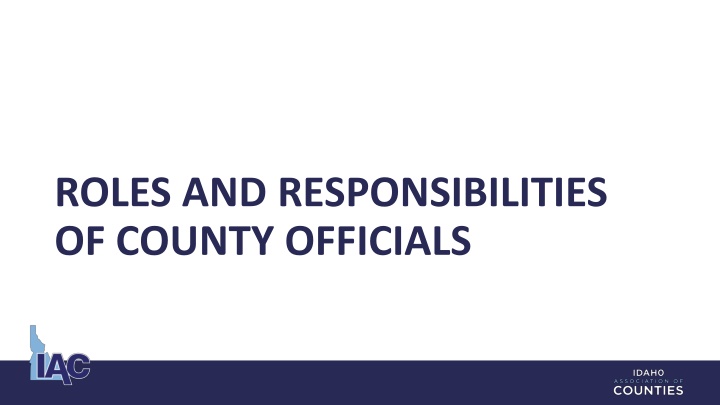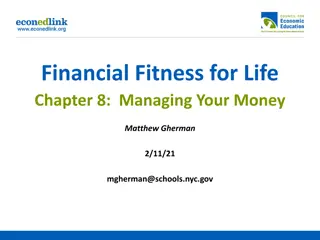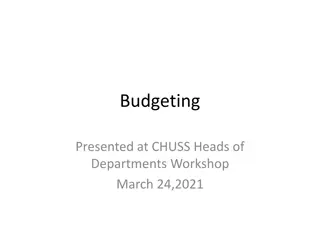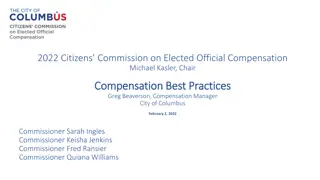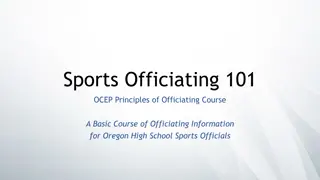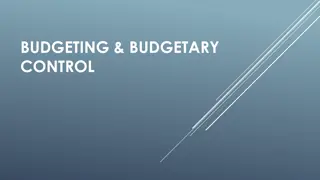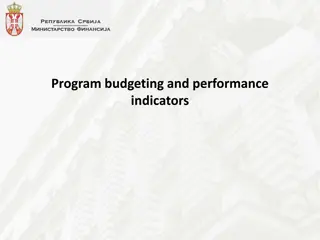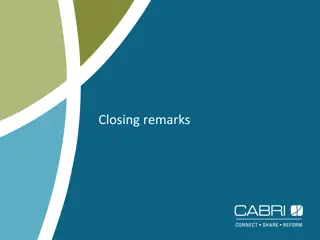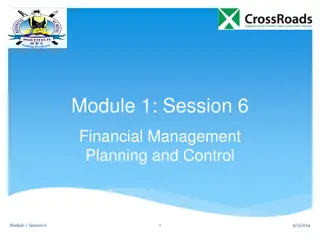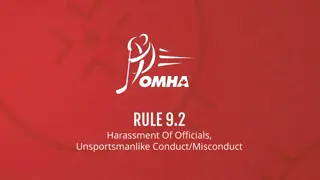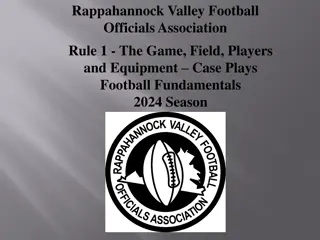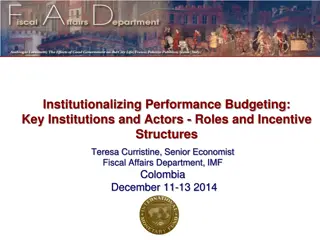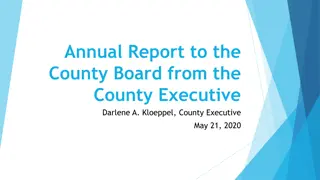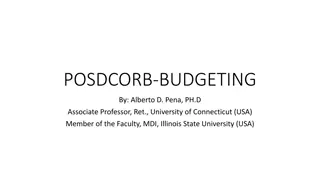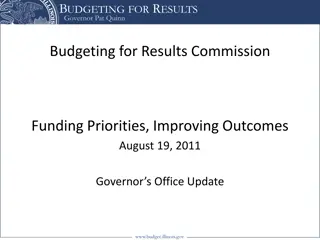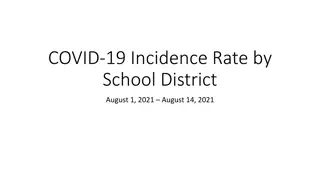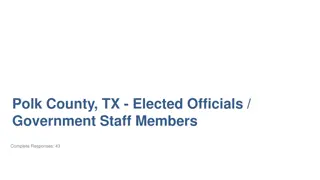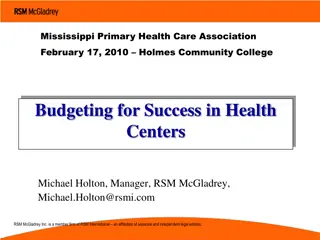County Officials' Roles and Budgeting Basics
A comprehensive overview of the roles and responsibilities of county officials in budgeting processes. Learn about the involvement of elected and appointed officials, the budget development timeline, the role of the county auditor, and steps involved in county budgeting. Explore the crucial functions of the county clerk and auditor as chief budget officers in managing county finances effectively.
Download Presentation

Please find below an Image/Link to download the presentation.
The content on the website is provided AS IS for your information and personal use only. It may not be sold, licensed, or shared on other websites without obtaining consent from the author.If you encounter any issues during the download, it is possible that the publisher has removed the file from their server.
You are allowed to download the files provided on this website for personal or commercial use, subject to the condition that they are used lawfully. All files are the property of their respective owners.
The content on the website is provided AS IS for your information and personal use only. It may not be sold, licensed, or shared on other websites without obtaining consent from the author.
E N D
Presentation Transcript
ROLES AND RESPONSIBILITIES OF COUNTY OFFICIALS
BUDGETING BASICS The budget is a document that sets county priorities through the allocation of county funds. Elected officials and department heads all have important roles in developing the county budget.
WHOSE BUDGET IS IT? The process of the county involves every elected and appointed county official. The county auditor and the board of county commissioners are generally the most directly involved in the county budget process. budgeting and financial
WHAT ABOUT INTERGOVERNMENTAL & NONPROFIT PARTNERS District Court Health Districts Community Colleges MPO s Regional Transit Authority Shared Jurisdiction (cities, highway districts, state) Social service partners (hospital districts, community crisis centers, substance abuse treatment, homeless/transitional housing, etc.)
6 STEPS OF COUNTY BUDGETING 1. Notice of budget hearing by Aril 30th( 63-802A) 2. Notify elected officials and department heads by 1stMonday in May to submit budget requests 3. Preliminary budget requests filed to clerk by 3rdMonday in May 4. Auditor presents recommended budget to BOCC by 1stMonday in August 5. Auditor publishes tentative budget by third week in August with notice of budget hearing 6. Budget hearing and adoption of budget in early September
COUNTY CLERK (AUDITOR) Chief Budget Officer (Section 31-1602, Idaho Code) Provides budget forms to county offices and departments to collect: Detailed revenues and expenditures from previous two years, Amounts received and expended in the current year, and Estimates for the ensuing year.
COUNTY AUDITOR IS BUDGET OFFICER Prepare preliminary budget for BOCC Oversees compliance with adopted budget First Monday in May get estimates of revenue from officials Third Monday in May estimates of expenditures due to Auditor Departments should ask for what is needed Avoid directives such as no more than 3% over last year List future year and prior 2 years
TENTATIVE BUDGET PREPARATION Clerk/Auditor prepares a suggested budget to be submitted to BOCC by 1stMonday in August (Section 31-1603, Idaho Code). Budget should include the following classifications: A Budget: Salaries B Budget: Detailed Other Expenses or Detailed Other Expenses and Benefits C Budget: Capital Expenses (not required) D Budget: Benefits (if not included in B budget)
SUGGESTED BUDGET Submitted by Auditor to BOCC by first Monday in August BOCC develops tentative budget after considering info from Auditor Auditor publishes tentative appropriations by 3rdweek in August Expenditures listed by category BOCC conduct public hearing (after notice published in official newspaper)
BOARD OF COUNTY COMMISSIONERS Meet with County Auditor to assist with financial planning. Best practice: Meet with each elected official and department head to review budget and discuss revenues and expenditures. Adopt tentative budget to be published by 3rdweek of August (Section 31-1603, Idaho Code) Hold a public budget hearing before the first Tuesday following the first Monday of September (Section 31-1605, Idaho). Any taxpayer may appear and be heard upon any part or parts of said tentative budget. Adopt the budget.
TENTATIVE BUDGET BASICS Reflects setting of property tax levy rates, county fees for service, etc. Reflects levels of service provided by county (maintenance budget, growth budget, hold backs, etc.) Should support the county s future growth demands Once published, a tentative budget can t be increased (unless republished)
OTHER ELECTED OFFICIALS & DEPARTMENT HEADS Provide budget requests and revenue estimate to Auditor in a timely manner. Penalty of up to $50 for noncompliance (Idaho Code Section 31-1602) Provide justification for budget requests. Attend public budget hearing to answer any questions (Idaho Code Section 31-1605). Work with Auditor throughout the year to keep them notified of unusual expenses or windfalls.
PUBLICATION OF TENTATIVE BUDGET Once the BOCC has approved a tentative budget, the County Clerk/Auditor is required by law to publish the tentative budget in the newspaper no later than the 3rdweek in August (Section 31-1604, Idaho Code).
BASIC RULE The aggregate of expenditures authorized against any fund shall not exceed the estimated revenues to accrue to such fund during the ensuing fiscal year from sources other than taxation together with any balances (and) plus revenues to be derived from taxation for such ensuing fiscal year.
THE BASICS Each official has a fiduciary responsibility to safeguard public money. Communicate throughout the year to keep elected officials, appointed officials, and the public informed.
STEPS TO IMPLEMENT BUDGET Fix levies to raise authorized revenue subject to statutory limits So then it s over right? Not really. You can adjust budget during fiscal year to reflect receipt of unscheduled revenue, grants or donations but you follow budget procedure prior to doing so. General Reserve Appropriation 5% of current expense fund not designated requires unanimous vote of BOCC (Section 31-1605, Idaho Code).
YEAR-TO-YEAR Appropriations expire at end of year, except designated incomplete improvements. Claims may be paid until first Monday in November. Incomplete improvements in progress of construction can be carried forward and shown in subsequent budget. Quarterly reports are required.
SOME REALITIES Budgets are not-to-exceed estimates. County budgets often face obligations that are outside of county control. Changes that increase appropriations need to follow the budget adoption process. You can not increase property taxes during a tax year. Cooperation among all elected officials is essential.
EMERGENCY EXPENDITURES More likely for counties because counties perform duties, often driven by actions of others Adopt resolution by unanimous vote to meet emergency need May spend all funds in treasury to meet emergency If exhaust funds, may borrow to meet needs
CLAIMS AGAINST THE COUNTY BOCC to examine, settle, and allow legal claims against the county (Section 31-809, Idaho Code). Claims must be accompanies by receipt (Section 31-1501, Idaho Code). BOCC approves checklist of allowed bills/claims (Section 31-1502, Idaho Code). Treasurer to only issues warrants for allowed bills/claims.
LIMITATION ON SPENDING Each and every county official or employee shall be limited in making expenditures or the incurring of liabilities to the respective amounts of such appropriations (Section 31-1606, Idaho Code).
GOVERNMENT ACCOUNTING: GASB What is GASB? Government Accounting Standards Board establishes accounting reporting standards at the state and local level (Section 31-1509, Idaho Code). GASB s purpose is to assist governing bodies to evaluate their operation and provide the public with easier to read reports due to the standardization of reporting. Each department must keep track of all assets/inventory according to the county policy.
ANNUAL AUDITS The county must have an audit performed by outside auditors (Section 67-450B, Idaho Code). Other audits by outside entities: Waterways/Snowmobile Grants PERSI Worker s Compensation
CHECKS AND BALANCES Role of the Board of County Commissioners 31-809: Examine and audit accounts 31-1701: Full and complete external audit 31-810: Examine and settle allowable claims Role of the County Clerk/Auditor 31-1602: Ensure budget compliance 31-1611: Quarterly financial statements to BOCC 31-1511: Jointly issue and sign warrants with the clerk/auditor 31-2304: Keep accounts current with the county treasurer Role of the County Treasurer 31-2113: Detailed report to BOCC 31-2112: Monthly/annual settlement of accounts 31-1511: Jointly issue and sign warrants with the clerk/auditor
FRAUD RISKS Credit card use monitor use and identify misuse of public funds (Section 18-5701, Idaho Code). Borrowing lunch money from a cash drawer. Easy/unsupervised access to petty cash. Pocketing cash as it comes in. Accounts payable watch for fake invoices or companies, double billing, etc.
FRAUD PREVENTION Make sure to comply with annual outside audit and other financial reporting requirements. Follow recommendations of outside auditor. Develop, adopt, and update county policies to prevent fraud (credit card policy, travel policy, county vehicle use policy, establish internal financial controls, etc.).
